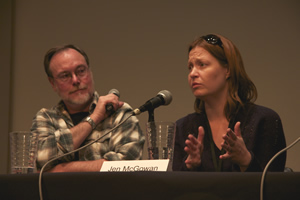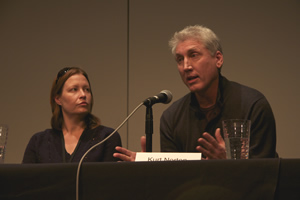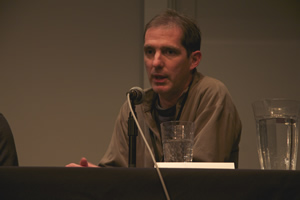Movies

New Releases • A-D • E-H • I-P • Q-Z • Articles • Festivals • Interviews • Dark Knight • Indiana Jones • John Wick • MCU
Filmmakers Panel: Persistence Is Key
Boulder International Film Festival
Boulder Public Library
19 February 2011
To use an analogy made famous in the movie Forrest Gump, Boulder weather in February is like a box of chocolates. You never know what you're going to get.
Fortunately, Feb. 19, 2011, was a beautiful day right smack in the middle of the Boulder International Film Festival, a four-day adrenaline rush of film that includes Waste Land, a feature documentary from Brazil, The Edge, Russia's entry for the Best Foreign Language Film Academy Award, and many points in between.
On hand for a panel discussion about film distribution channels were a half-dozen of the filmmakers in attendance at the festival:

Brad Weismann and Jen McGowan

Jen McGowan and Kurt Norton
- Vadim Jendreyko, director of the feature documentary The Woman with the 5 Elephants, about Swetlana Geier, who's translated Dostoyevsky's five great novels from Russian to German; collectively the works are referred to as the "five elephants."
- Suzan Beraza, director of the feature documentary Bag It!, about the environmental problems being created by the ubiquitous use of plastic bags.
- Don Hahn, director of the feature documentary Hand Held, about a photojournalist's efforts to bring relief to Romanian orphanages.
- Jen McGowan, director of the fictional short film Touch, about isolation and love intersecting while waiting two people wait for a train.
- Kurt Norton, director of the feature documentary These Amazing Shadows, about the significance of the National Film Registry and the films included therein.
- Christophe Fauchere, director of the feature documentary Mother: Caring Our Way Out of the Population Dilemma, which explores the issue of population growth.
For those interested in filmmaking, those with screenplays sitting in the back of the head or typed up and sitting on the desk, and those who think making a film is a sure way to make big bucks fast, the panel discussion presented a lot of useful information, both sobering and inspiring.
Consider this: An incredible number of film festivals occur around the world these days. Of course the big guns are Cannes, Toronto, Venice, and New York. But even the relatively small, intimately-scaled Boulder International Film Festival received submissions totaling somewhere in the neighborhood of 1,000. Out of that sum, only 50 or so made it onto the festival's slate.
The explosion in festivals and independent film production has been aided and abetted by the rapid advancement of technology. It's a bane and a blessing. More, cheaper technology makes it more affordable for more people to make films. That also means there are more people making more films, which translates into more films looking for eyeballs.
The competition is fierce. But, as each and every one of the panelists will attest, perseverance and desire are key.
How do badly do you want to tell your story?
All six panelists agreed that the completion of filming and editing, a landmark accomplishment as it is, signaled only the completion of a phase in the filmmaking cycle. In fact, the completion of filming is only the beginning. There's a whole journey still to be made in getting the movie out there, getting it exhibited. There's the film festival circuit, but there are other avenues as well. Options like IFC, DVD, Blu-ray, online streaming, on-demand.
The industry is looking forward to pure digital distribution, but the baby boomers like the tactile benefits of a personal library. As Brad Weismann, the panel moderator, chided, what will people say down the road, "Check out my queue!"?
The studios like the shorter release window between theatrical and home outlets because they can run one marketing campaign instead of starting up a whole new campaign for the home video release.
All of the options available today represent significant opportunities, but each has its own challenges. The distribution model will vary from independent film to independent film.
As could be expected, the panel discussion as a whole drifted away from the nitty-gritty of distribution mechanics and logistics and focused, as directed by the questioning of numerous would-be filmmakers in attendance, on the topic of simply (or, more to the point, not-so-simply) getting a movie made.
Here's a rundown of some of the food for thought raised during the discussion:

Vadim Jendreyko, Suzan Beraza, and Don Hahn

Christophe Fauchere
- Are you going for a walk or do you want to climb a mountain? How much effort are you prepared to put into making it happen?
- What do you have to say?
- As a starting point, contact producers who seem to have a similar mindset and would therefore likely be interested in your project.
- Appreciate the rejections. They will come, but don't leave empty-handed. Get something out of the discussion, a recommendation for somebody else who might be interested, for example.
- Network at film festivals.
- Use the Internet strategically; don't give your movie away online, but perhaps supplement your marketing work with clips from your film.
- There is a snowball effect; people are reluctant to be the first to like something, but once somebody steps forward to say they like your work, then others will follow.
- Everybody really wants you to succeed at your endeavor, and they want to be able to ride on your success as well, but they just don't want to risk losing any of their resources.
- You are not alone. There were several people in the audience who had more than one completed screenplay and were struggling to get it sold, or even read.
- It's a matter of priorities. For example, Jen McGowan has two priorities: her family and filmmaking. You can only have so many Number One priorities. For Jen, things like weddings and other events are all weighed against the needs of her family and her film projects.
- Be judicious and strategic in regard to applying to film festivals. The application fees alone have the potential to blow your budget quickly.
- The panelists have been working on and with their current films for 2-6 years each.
- There's a window of opportunity of around 18-24 months, then your movie's considered "too old" for most festivals.
At the same time, one point that didn't get raised explicitly is that Hollywood needs ideas and needs screenplays. It's a currency of the business.
Personally, the best bit of advice came from Jen. She emphasized the persistence aspect and offered this tidbit that is either inspiring or intimidating, depending on your point of view: there are people out there who aren't good now, but they will be good down the road because they'll keep working on it – because it's their Number One priority.
• Originally published at MovieHabit.com.


